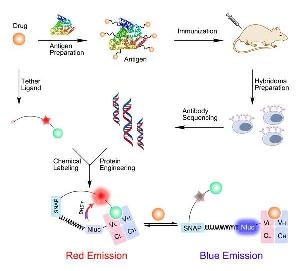May 17 2017
 Credit: EPFL
Credit: EPFL
Several antibody-based biosensors, capable of helping healthcare centers in developing countries or even patients in their own homes to monitor drug concentration in the blood, have been developed by a team of EPFL scientists.
The aspect of monitoring drug concentration in a patient’s blood is considered to be essential for any pharmaceutical treatment. However, this needs facilities and equipment that are mostly not available in the healthcare field of developing countries, and also holds back the quality of life for patients elsewhere. Working through their startup LUCENTIX, EPFL scientists have recently developed an antibody-linked biosensor capable of tracking drug concentration in the blood by changing its color. The biosensor is placed into a full system that can be employed by patients at home or in the field. The science behind it has been featured in Angewandte Chemie.
The lab of Kai Johnsson at EPFL is well known for producing biosensors, and the research led to the development of the startup LUCENTIX, which has produced a biosensor that permits patients to effortlessly measure drug concentrations in their system without the requirement for complex lab systems.
The biosensor is actually a molecule made up of three components: A protein capable of binding the drug to be monitored; the light-producing enzyme luciferase, and SNAP-tag, which refers to a “tagging” molecule carrying fluorescent ligand that the protein (the first component) recognizes and binds when drugs are not available. This leads to a reaction between the luciferase and the fluorescent molecule known as “bioluminescent resonance energy transfer” (BRET), which generates a red light.
The latest innovation, performed by postdoc Lin Xue, replaces the binding protein of the biosensor with part of an antibody produced against the target drug. When the drug is detected and bound by the biosensor in the patient’s saliva or blood, the antibody “prefers” to bind this rather than the SNAP-tag’s fluorescent ligand. The BRET reaction is progressively disrupted as the ligand is displaced, and a blue light is emitted.
Antibodies are capable of naturally identifying and binding foreign molecules, thus turning the immune systems against potential infections. Generating antibodies that have the potential to particularly identify tiny molecules like drugs is a regular procedure. This explains the fact that the monitoring system can be adapted to almost an unlimited number of molecules, while patients can perform the monitoring themselves at home and also obtain laboratory-level quality information. The existing lab methods for doing this are complicated and costly, and diminish the quality of life for patients who often have to be close to or confined within hospitals.
A general pipeline for the generation of biosensors is established by replacing the binding protein with an antibody, and this pipeline is capable of identifying a synthetic drug in a patient’s blood sample. As proof-of-principle, the EPFL scientists succeeded in performing laboratory tests of the new biosensors against three drugs, quinine, theophylline, and methotrexate. The step following this is to optimize the sensitivity of the biosensor allowing it to detect the nanomolar or even lower concentrations of biomolecules/drugs in clinical samples.
The Swiss National Science Foundation, the NCCR Chemical Biology, and EPFL funded this work, which also received contributions from EPFL’s Protein Expression Core Facility.
Antibody biosensor offers unlimited point-of-care drug monitoring